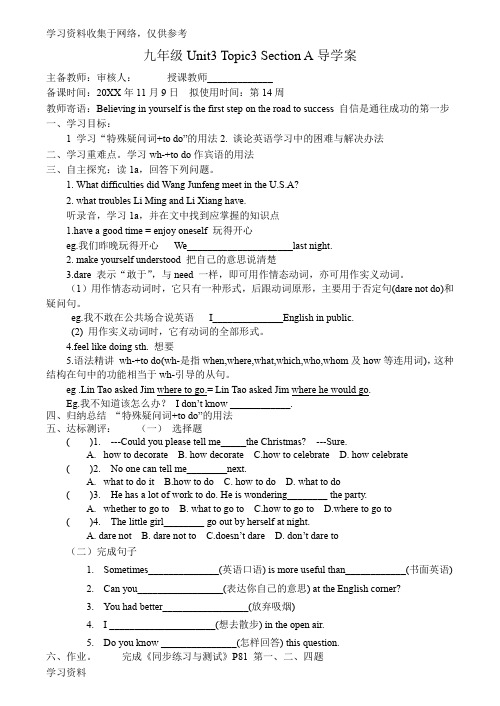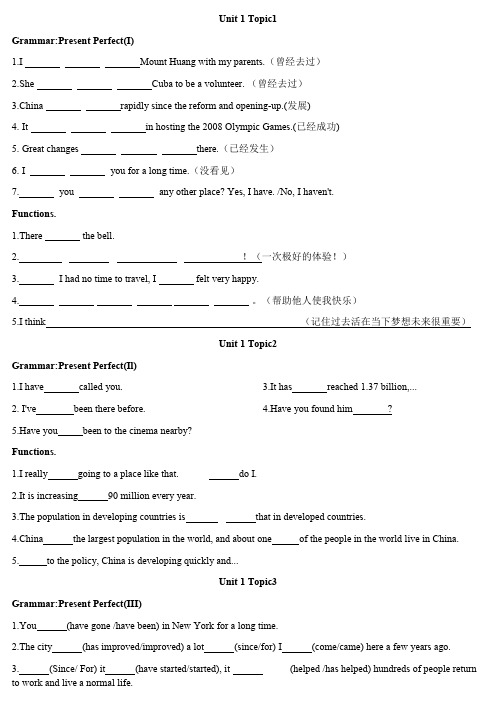仁爱英语九年级上Unit 3 Topic 3 Section D
- 格式:ppt
- 大小:1.25 MB
- 文档页数:17

九年级Unit3 Topic3 Section A导学案主备教师:审核人:授课教师_____________备课时间:20XX年11月9日拟使用时间:第14周教师寄语:Believing in yourself is the first step on the road to success 自信是通往成功的第一步一、学习目标:1 学习“特殊疑问词+to do”的用法2. 谈论英语学习中的困难与解决办法二、学习重难点。
学习wh-+to do作宾语的用法三、自主探究:读1a,回答下列问题。
1. What difficulties did Wang Junfeng meet in the U.S.A?2. what troubles Li Ming and Li Xiang have.听录音,学习1a,并在文中找到应掌握的知识点1.have a good time = enjoy oneself 玩得开心eg.我们昨晚玩得开心We_____________________last night.2. make yourself understood 把自己的意思说清楚3.dare 表示“敢于”,与need 一样,即可用作情态动词,亦可用作实义动词。
(1)用作情态动词时,它只有一种形式,后跟动词原形,主要用于否定句(dare not do)和疑问句。
eg.我不敢在公共场合说英语I______________English in public.(2) 用作实义动词时,它有动词的全部形式。
4.feel like doing sth. 想要5.语法精讲wh-+to do(wh-是指when,where,what,which,who,whom及how等连用词),这种结构在句中的功能相当于wh-引导的从句。
eg .Lin Tao asked Jim where to go.= Lin Tao asked Jim where he would go.Eg.我不知道该怎么办?I don’t know ____________.四、归纳总结“特殊疑问词+to do”的用法五、达标测评:(一)选择题( )1. ---Could you please tell me_____the Christmas? ---Sure.A.how to decorateB. how decorateC.how to celebrateD. how celebrate( )2. No one can tell me________next.A.what to do itB.how to doC. how to doD. what to do( )3. He has a lot of work to do. He is wondering________ the party.A.whether to go toB. what to go toC.how to go toD.where to go to( )4. The little girl________ go out by herself at night.A. dare notB. dare not toC.doesn’t dareD. don’t dare to(二)完成句子1.Sometimes______________(英语口语) is more useful than____________(书面英语)2.Can you_________________(表达你自己的意思) at the English corner?3.You had better_________________(放弃吸烟)4.I _____________________(想去散步) in the open air.5.Do you know _______________(怎样回答) this question.六、作业。

Unit 1 Topic1Grammar:Present Perfect(I)1.I Mount Huang with my parents.(曾经去过)2.She Cuba to be a volunteer. (曾经去过)3.China rapidly since the reform and opening-up.(发展)4.It in hosting the 2008 Olympic Games.(已经成功)5.Great changes there.(已经发生)6.I you for a long time.(没看见)7. you any other place? Yes, I have. /No, I haven't.Functions.1.There the bell.2. !(一次极好的体验!)3. I had no time to travel, I felt very happy.4. 。
(帮助他人使我快乐)5.I think (记住过去活在当下梦想未来很重要)Unit 1 Topic2Grammar:Present Perfect(Il)1.I have called you.2. I've been there before.3.It has reached 1.37 billion,...4.Have you found him ?5.Have you been to the cinema nearby?Functions.1.I really going to a place like that. do I.2.It is increasing 90 million every year.3.The population in developing countries is that in developed countries.4.China the largest population in the world, and about one of the people in the world live in China.5. to the policy, China is developing quickly and...Unit 1 Topic3Grammar:Present Perfect(III)1.You (have gone /have been) in New York for a long time.2.The city (has improved/improved) a lot (since/for) I (come/came) here a few years ago.3. (Since/ For) it (have started/started), it (helped /has helped) hundreds of people return to work and live a normal life.Functions.1.Oh, you will get to it very soon if you come. 3.You must come for a .2. a of fact, it's a wonderful place to live.4.Well, once they find people , they decide suitable ways to offer them help.5.The program also provides them job training they can find jobs again.Unit 2 Topic1Grammar:Simple Past ﹠ Present Perfect1.I (go) there two years ago.2.There (be) lots of fowers and grass.3.What (happen) here?4.I have (be) like this since last week5.The flowers and grass (go)!Functions.1.Oh, what a !(乱)2.There are several chemical factories waste water the stream.3.What's , the factory makes too much noise.(更糟糕)4.Noise humans' health.(对…有害)5.People work and live in noisy conditions often .(变聋)6....many teenagers in America can hear no than 65-year-old people do,...7....does great to people's hearing.Unit 2 Topic2Grammar:Indefinite Pronoun and Adverb1. of us likes pollution.2.Don't spit in public.3. should care for wild animals and plant more trees.4.We should do we can to protect the environment.Functions.1. a (结果), a lot of rich land has changed desert.2.Trees can stop the wind from the earth .3.We shouldn't leave rubbish .4.All these problems are very serious, we must do something now.Unit 2 Topic3Grammar:Compound Sentence1.Recycling can protect the environment, it can save money, too.2.Some things we have done are good for the earth some are bad.3.We should do everything to protect it, we'll be punished and lose our home.4.People produce power from coal, it is very dirty and causes acid rain. Functions.1.Would you like to be a person?3. (说起来容易做起来难)4. .(行动大于雄辩)5.The train can a top speed of 431 km per hour.2.First, you ought to the electricity when you leave a room.Unit 3 Topic1Grammar: Passive Voice ( I)1.Disneyland by millions of people from all over the world.2. English as the official language in Cuba?3.Of all these languages, English the most widely .Functions.1.I can't ! 3. a good trip. I you success!2.Try your and work much harder from now on.Unit 3 Topic2Grammar: Showing the Future by Present Continuous1.I to Disneyland.(将乘飞机)2.He to London next Sunday.(去)3.My uncle us tomorrow.(见面)4.When Bob to London?(将去)Functions.1. (怎么了?无需担心。

仁爱版英语九年级上册Unit3知识点归纳Unit 3 Knowledge Points in the Ren'ai Edition of English 9th GradeIn the Ren'ai Edition of English 9th grade, Unit 3 covers various important knowledge points that are crucial for students' understanding and mastery of the English language. This unit delves into the topic of travel, exploring different aspects such as travel plans, vocabularies related to transportation and accommodation, as well as polite expressions commonly used during travel.Firstly, this unit emphasizes the importance of making travel plans. Students learn how to talk about their upcoming trips, including the destinations, means of transportation, and accommodation arrangements. They also acquire skills in expressing preferences, making suggestions, and providing advice to fellow travelers. These skills enable students to engage in conversations about travel plans naturally, making interactions with others more enjoyable and effective.Secondly, the unit focuses on expanding students' vocabulary related to transportation and accommodation. Students are introduced to a range of transportation modes, such as buses, trains, planes, and cruise ships. They learn how to use appropriate vocabulary to describe different types of vehicles, their features, and the experiencesassociated with each mode of transport. Similarly, students also become familiar with various types of accommodation, such as hotels, hostels, and campsites. They learn how to describe the facilities, services, and advantages of different types of accommodation, as well as how to make reservations.In addition to vocabulary expansion, Unit 3 emphasizes the use of polite expressions during travel. Students learn how to greet people, ask for directions, and make requests politely. They also practice expressing gratitude and apologizing when necessary. Politeness is a vital aspect of communication, and mastering these expressions enables students to navigate through different social and cultural contexts with ease and respect.Furthermore, this unit provides opportunities for students to engage in various reading and listening activities. Through these activities, students develop their reading and listening comprehension skills, as well as their ability to extract relevant information from texts and audio materials. They learn how to comprehend travel-related passages, identify main ideas, and make inferences. These activities not only enhance their language proficiency but also broaden their knowledge about different travel destinations and the experiences associated with them.In terms of writing skills, Unit 3 focuses on developing students' ability to write a travel diary entry. Students are guided in organizing their ideas, using appropriate vocabulary and grammar structures, and expressing their personal experiences and reflections about their travels. This exercise helps students improve their writing skills, creativity, and self-expression, as well as consolidating their understanding of theunit's vocabulary and grammatical structures.Overall, Unit 3 in the Ren'ai Edition of English 9th grade is a comprehensive and engaging unit that encompasses various knowledge points essential for students' language development. By exploring travel-related topics and practicing relevant skills, students enhance their vocabulary, grammar, and communication abilities. They also gain a deeper understanding of the world and its diverse cultures as they embark on an English language journey that extends beyond the classroom.。

Unit 3 English around the worldTopic3 Could you give up some advice on how to learn English well? 一.重要句型:Section A1.Could you make yourself understood in the USA? 在美国别人能听懂你说话吗?make oneself understood 让别人听懂,让别人明白某人的意思;understood为过去分词作宾语补语。
I find it difficult to make myself understood. 我发现自己很难让人理解。
I think I should work harder at English. 我想我应该更加努力地学英语。
A. work hard at..... 在.....方面努力,致力于......;They are working hard at oral English. 他们努力练习英语口语。
B. hard- working adj. 努力的,勤奋的;其为复合形容词,用作定语,后跟名词;He is a hard-working child. 他是一名勤奋的孩子。
2.I know oral English is very important, but I dare not speak English in public.我知道口语非常重要,但是我不敢在公共场合说英语。
(1) oral English = spoken English 口语;(2) dare 表示“敢于”,与need一样,既可用作情态动词动词,也可用作实意动词。
用作情态动词,它只有一种形式,后跟动词原形,主要用于否定句或疑问句。
用作实义动词时,它有三单形式dares,现在分词daring,过去式和过去分词dared,后跟带to的不定式。
练一练:⑴As a little girl,she __ go out by herself at night.A.dares notB.doesn’t dare toC.dare not toD.dares not to⑵“How dare you _______to me like that?” he shouted.A.to speakB. speakingC.spokenD.speak3.I always feel sleepy in English classes.上英语课我还总是犯困。


仁爱版九年级英语u3t3知识点Unit 3, Task 3 of the Ren'ai version of ninth gradeEnglish focuses on different knowledge points related to the unit.1. Grammar:- Relative clauses: these are subordinate clauses that modify nouns. They begin with relative pronouns such as "who", "whom", "whose", "which", or "that". Example: The boy wholives next door is my friend.- Passive voice: this is a grammatical construction where the subject of the sentence receives the action. Example: The book was written by Mark Twain.- Indirect speech: used to report someone's words without repeating them exactly. Example: He said that he would come later.2. Vocabulary:- Describe personalities: words and phrases used to describe someone's character traits, such as "friendly", "outgoing", "shy", "generous", etc.- Qualities and skills: words and phrases used to describe positive qualities or abilities, such as "hardworking", "intelligent", "creative", etc.- Vocabulary related to sports: words and phrases used to describe different sports and related terms, such as "athlete", "competition", "team", etc.3. Reading comprehension:- Understanding the main idea and supporting details: being able to identify the main idea of a text and find the supporting details that provide evidence or examples.- Inference: drawing conclusions based on the information given in the text.- Vocabulary in context: understanding unfamiliar words based on their context within the text.These are some of the key knowledge points covered in Unit 3, Task 3 of the Ren'ai version of ninth grade English.。
Unit3 Topic3 课文重难点讲解Section A【1】I know oral English is very important, but I dare not speak English in public.我知道英语口语非常重要,但是我不敢当众说英语。
(1) oral English = spoken English 英语口语(2) in public意为“公共地,当众,公然地”。
如:He doesn’t like to speak in public.他不喜欢在公共场合讲话。
W e shouldn’t throw litter around in public.在公共场合我们不应该乱丢垃圾。
(3) 本句中的dare是个情态动词,意为“敢于”。
与我们学过的其他情态动词一样,后面跟动词原形,其否定句在dare后加not,疑问句把dare提到主语之前。
如:I dare not tell him the truth. 我不敢对他讲实话。
How dare you say that? 你竟敢那样说?此外,dare还可以作实义动词。
当它作实义动词的时候,后面通常接带to的不定式,但实际上常常省略。
用作实义动词时,它有动词的全部形式,即第三人称单数dares, 现在分词daring以及过去式和过去分词dared。
如:He doesn’t dare (to) say anything.他什么也不敢说。
dare通常不用于肯定句,除了I dare say (我想……)这一说法。
如:I dare say there will be a restaurant car on the train. 我想这火车上会有餐车。
Section B【1】Kangkang, could you give us some advice on how to learn English well? 康康,你能给我们一些关于如何学好英语的建议吗?give sb. some advice on/about...意为“给某人—些有关……的建议”,介词on/about 大多数情况下可通用,但若表示较为正式的话题,应用on。